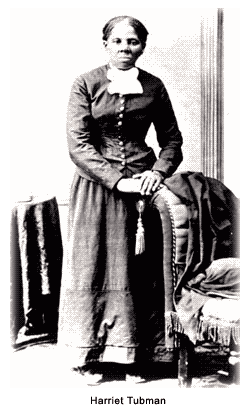Possibly the most famous of all the Underground Railroad's heroes, Harriet Ross Tubman managed over a decade to make 19 trips into the South and lead more than 300 slaves to freedom. And, as she once said, in all of her journeys "I nebber run my train off de track and I nebber lost a passenger."
 Harriet Ross was born into slavery in Dorchester County, Maryland, approximately 1821. At age five, she went to work as a house slave. Seven years later, she was put out for field work. At age 12, Harriet sustained an injury that would afflict her for the duration of her life. By holding her ground in a doorway, she shielded a fellow field hand from an angry master, who then hurled a two-pound weight. Missing its intended target, the weight struck Tubman on her head. She never completely recovered from the blow, whose effects subjected her to episodes resembling narcolepsy.
Harriet Ross was born into slavery in Dorchester County, Maryland, approximately 1821. At age five, she went to work as a house slave. Seven years later, she was put out for field work. At age 12, Harriet sustained an injury that would afflict her for the duration of her life. By holding her ground in a doorway, she shielded a fellow field hand from an angry master, who then hurled a two-pound weight. Missing its intended target, the weight struck Tubman on her head. She never completely recovered from the blow, whose effects subjected her to episodes resembling narcolepsy.
Approximately 1844, Harriet married a free man named John Tubman and lived with him in a state of semi-slavery. Her status changed with the death of her master in 1847 and his son's death in 1849. Fearing that she was to be sold and sent south, Tubman decided to run away. With the help of a sympathetic white woman, Tubman got her chance. She wended her way to Philadelphia, Pennsylvania, using the North Star as a nightly guide. There she secured employment and began to save part of her earnings.
In 1845, Tubman returned to Maryland to guide her sister and the latter's two children to the North. Another perilous trip to the South led to the rescue of her brother and two other men. On her third return, she went for her husband, but he had remarried. In his stead, she located more liberty-seeking slaves and took them to the North. She also rescued her parents. Eventually, she resettled members of her family in St. Catharines, Ontario.
"Conductor" Tubman returned to the South 16 more times. She refined wily and sometimes tough escape methods, such as
Striking friendships with the leading abolitionists of the day, Tubman lent her presence to their meetings. John Brown, who consulted with the heroine (calling her "General Tubman") about his impending raid at Harper's Ferry, said she was "one of the bravest persons on this continent." And Frederick Douglass said, "Excepting John Brown ... I know of no one who has willingly encountered more perils and hardships to serve our enslaved people..."
During the Civil War, Harriet Tubman worked for the Union as a spy, nurse and cook. In 1869, she married an African-American war veteran, Nelson Davis, who died in 1890. Harriet Tubaman died in Auburn, New York, in 1913.